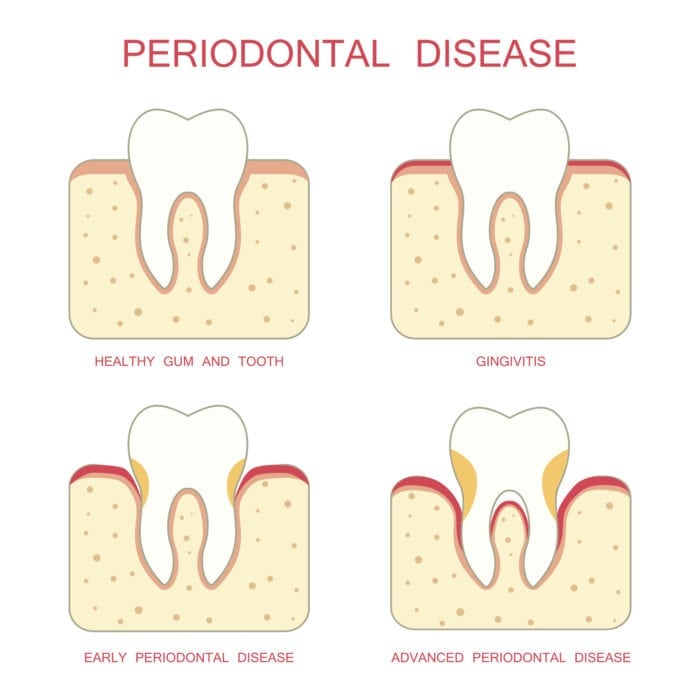Dr. Dechter and Dr. Moy can diagnose and treat gum disease in Silver spring. They place an emphasis on the importance of gum health in the long term care of your smile.
The gums perform a key role in supporting oral health and also provide an important barrier between harmful bacteria in the mouth and the bloodstream. Healthy gum tissue supports healthy, stable teeth and is a necessary part of keeping your natural oral structure stable throughout your life.
Routine dental care can provide a foundation for maintaining gum health, providing the opportunity for us to screen for the early signs of gum disease. If you catch and treat gum disease early, less invasive treatments can be successful.
Minimizing the incidence of gum disease through routine dental care can greatly reduce the risk of other dental problems and even tooth loss. Gum disease, more specifically periodontitis, is a leading cause of tooth loss in adults today. You can easily prevent it with good oral hygiene.

Stages of Gum Disease
Gum disease is a progressive disease and has two distinct stages of development. Recognizing the stages of early gum disease is important. This way your dentist can address it before damage occurs to soft tissues and the teeth.
- Gingivitis.Gingivitis is the early stage of gum disease. Dentists characterize it by looking for signs of red or swollen gums, bleeding gums, increased sensitivity, or irritation of the soft tissues. These symptoms are often most noticeable during tooth brushing and daily oral hygiene.
- Periodontitis. This stage affects the gum tissue and also begins to impact the integrity of the teeth. Symptoms can include those of gingivitis as well as changes in the fit of the bite, shifting and loose teeth, changes in the fit of an oral appliance, and deep pockets between the teeth and gums.
- Advanced Periodontitis: At this stage, there may be bone loss around the teeth which can lead to tooth loss. Treatment for advanced periodontitis includes scaling, root planing, antibiotic therapy, and oral surgery to remove the disease.
We will evaluate the condition of your gums if the signs of gum disease are evident. We can also use advanced digital diagnostics as needed if there is damage that goes beyond the gum line.
Gum Disease Treatment
The goal of periodontal therapy is to reduce the inflammation and pain caused by gum disease, and restore your gum health. Treatment is dependent upon the stage of your gum disease and any damage that you have to your mouth. For patients who may have chronic gum disease due to genetics or a medical condition, we offer personalized care for your needs to help you maintain healthy gums between visits. Treatment for gum disease can include:
Antibacterial Rinse
Using an anti-bacterial rinse is a the most conservative approach to early stage gingivitis. We will suggest it as part of your daily oral hygiene routine to minimize plaque on the teeth and gums. Patients with chronic gum disease may get a prescription as an ongoing treatment.
Scaling and Root Planing
This treatment is a thorough cleaning of all tooth surfaces and along the gum line. Scaling and root planing also removes plaque from deep pockets where it affects exposed tooth roots. The goal is to remove bacteria and allow the gum tissue to begin to heal and regenerate to avoid larger problems with the teeth.
Oral Surgery
For patients with advanced periodontitis we may need to coordinate care with a local oral surgeon. Our trusted oral surgeon can remove or repair damaged gum tissue and set the stage for the healing process. The surgeon will also remove any infected bone tissue. It can be performed under local anesthesia or under general anesthesia. The duration of this procedure can vary from 30 minutes to one hour depending on the extent of removal of infected tissue.
Frequently Asked Questions About Gum Disease
Does pregnancy cause bleeding gums?
The hormonal changes that occur during pregnancy can often lead to more sensitive soft tissues in the mouth and patients may notice that their gums bleed or seem more sensitive. It is important to visit with us for routine care or to address any new concerns while pregnant to maintain your overall health and wellness.
Is bad breath a sign of gum disease?
Yes. Bad breath, also called halitosis, can be a sign of gum disease. It is often present in patients with periodontitis as bacteria significantly impact the gums.
Can gum disease cause heart problems?
Gum disease can lead to heart problems. People who suffer from gum disease may be more prone to having a heart attack, stroke, or heart disease. This happens when the infection in your gums reaches your bloodstream.
Will I lose my teeth if I have periodontal disease?
Without treatment, periodontal disease may cause issues in soft tissue. It may entirely destroy soft tissue, and will continue to eat away at bones that support your teeth. This may cause your teeth to become loose or fall out.
Can gum tissue grow back?
Gum tissue does now grow back. Once the disease damages your gums, the tissue will not regenerate. Taking better care of your gums may build them up and make them stronger. However, damaged gums cannot regrow.
